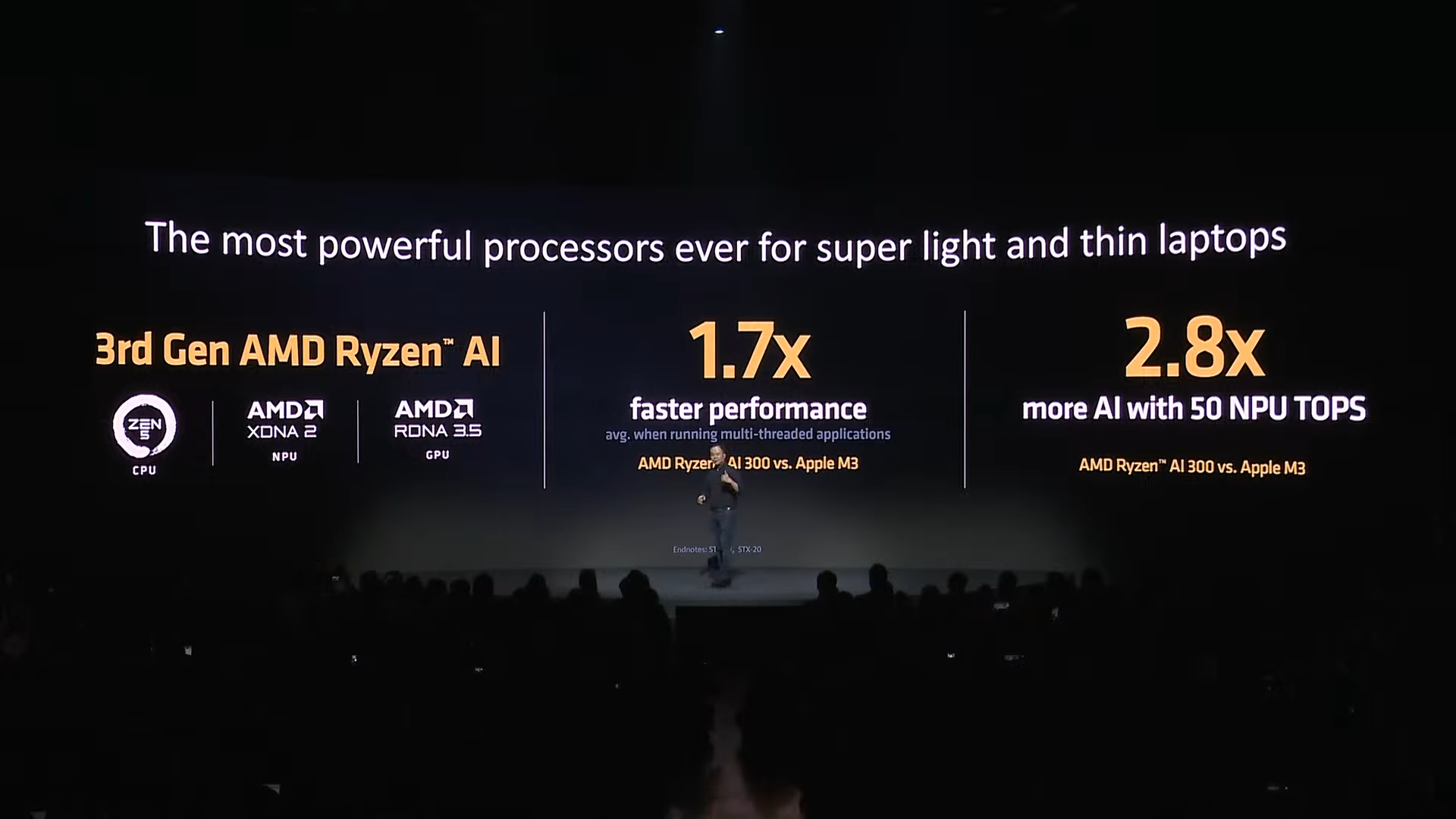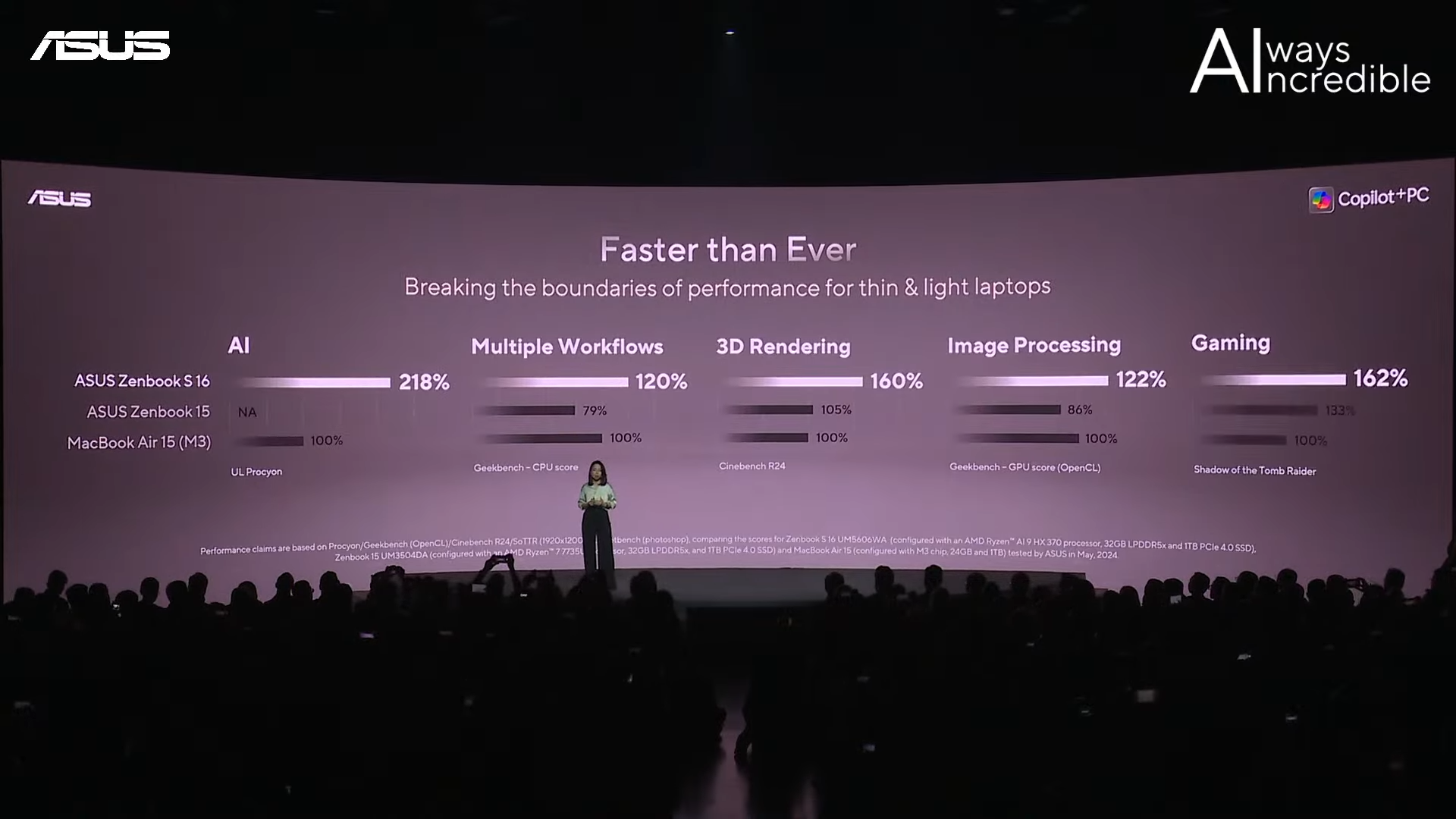Asus claims its Zenbook S16 beats the MacBook in power and portability: Here's why I think Asus is right
Can the Zenbook S16 really outdo the MacBook?

Sign up to receive The Snapshot, a free special dispatch from Laptop Mag, in your inbox.
You are now subscribed
Your newsletter sign-up was successful
Asus is pitting the Zenbook S16 against the MacBook, and we think it might win.
Asus held its "Always Incredible" Computex launch event on Monday, unveiling its new laptops and monitors, and how the company is committed to the future of AI.
Halfway through the keynote, Jack Huynh, AMD Senior Vice President & General Manager of Computing and Graphics Group, came on stage to discuss the benefits of AMD's partnership with the company.
While discussing the power of its new 3rd Gen AMD Ryzen AI processor, he made a bold statement when comparing it to MacBook: "Our mission was to create the most powerful processors in the world that are in super light and thin laptops. Laptops that are faster than MacBook Pro, thinner than MacBook Air. And we have done that today with Asus with the Zenbook S16."
Is Asus for real? Let's jump into what Asus claimed.
What is Asus claiming exactly?
Huynh continued to say "we have 1.7x more performance than MacBook Pro, 2.8x more AI TOPS than the Apple M3." Accompanying him are slides stating that these comparisons are made with the AMD Ryzen AI 300 vs the Apple M3.

But what is the Asus Zenbook S16 actually packing that makes it so impressive? It's built with up to an AMD Ryzen AI 9 HX 370 processor featuring AMD Radeon 890M integrated graphics and 50 NPU TOPS. A series of slides reveal how it outperforms the MacBook Air 15 (M3) in AI through UL Procyon by 118%, Geekbench CPU scores by 20%, 3D rendering through Cinebench by 60%, image processing by 22%, and gaming by 62% (playing Shadow of the Tomb Raider).
Sign up to receive The Snapshot, a free special dispatch from Laptop Mag, in your inbox.
Its design also features what Asus calls an "industry first innovation" that "offers the best of both worlds" by providing the sturdiness of aluminum alongside the malleability of ceramics. Asus calls this "ceraluminum." It also features a 16-inch OLED touchscreen at 3K resolution with a panel at 120Hz refresh rate, a 78Wh battery, and six speakers (four woofers/two tweeters).
Claiming that the Zenbook S16 will outperform the Apple MacBook Pro M3 while staying thinner than the MacBook Air is phenomenally bold. This would create a unique combination of phenomenal performance and ultraportability. You might assume Asus is just blowing hot air, but based on previous tests, we have reason to believe the company could pull through on this promise.
Asus' challenge to Apple has more weight than expected
Asus claims that its laptops can be "faster than MacBook Pro, thinner than MacBook air" through the power of the 3rd Gen AMD Ryzen AI processor. And when it comes to the Zenbook S16, it apparently manages both. While that may seem like a bold challenge at the surface level, our tests on previous MacBook laptops showcase that they've already outperformed MacBook in these categories.
Insofar as performance, the Asus Zenbook 14 OLED (2024) is built with an Intel Core Ultra 7 155H processor. On the Geekbench 6 test, which is a benchmark that measures system performance, it achieved a score of multi-core score of 12,707. The MacBook Pro 14 with M3 managed a multi-core score of 11,870 on the same test.

If we look back to 2023, the Asus Zenbook S 13's 2.2-pound design with 0.43 inches of thinness made it smaller and lighter than the MacBook Air M2's 2.7-pound weight and 0.44 inches of thinness. In reality, that difference is practically invisible, but it still shows that the company can compete with Apple in this category.
However, the Zenbook 14 OLED does not outdo the latest MacBook Air in thinness, while last year's Zenbook S 13 performs significantly worse when compared to a MacBook Pro M2. To state that the Zenbook S16 will do both at the same time is a bold statement, but if the company can pull it off, it would be a massive accomplishment.
We don't have exact measurements of the Zenbook S16, but the company claims it's 1.1 centimeters thin. A rough conversion into inches brings that to around 0.43 inches, which would beat the MacBook Air M3 13 and 15's 0.44-inch and 0.45-inch thinness respectively. If that reflects its exact measurements, it's just a matter of whether the Zenbook S16 can outperform the MacBook Pro M3.
Asus cannot beat MacBook at everything
While Asus is so proudly flaunting how its Zenbook S16 will compete against MacBook, there are some things that the company has solidified itself as unstoppable in. The biggest is battery life, with the latest M3 MacBooks featuring a power efficiency that makes every other notebook shiver in fear.
On the Laptop Mag battery test, which involves continuous web surfing at 150 nits, the MacBook Air 13 M3 lasted 15 hours and 13 minutes, while the MacBook Pro 16 M3 Max lasted 18 hours and 5 minutes. While exceptions like the Asus Zenbook 14 OLED lasted 15 hours and 52 minutes, battery life that good is the standard for Apple. It's unlikely we'll see longevity anywhere near this good on the Zenbook S16, but we're more than ready for a surprise.

Self-described art critic and unabashedly pretentious, Claire finds joy in impassioned ramblings about her closeness to video games. She has a bachelor’s degree in Journalism & Media Studies from Brooklyn College and five years of experience in entertainment journalism. Claire is a stalwart defender of the importance found in subjectivity and spends most days overwhelmed with excitement for the past, present and future of gaming. When she isn't writing or playing Dark Souls, she can be found eating chicken fettuccine alfredo and watching anime.
